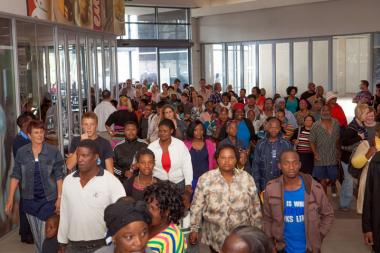Shopping centres owners gain on positive results
 The latest figures from Investment Property Databank (IPD) confirm there has been a general improvement in retail trading conditions in recent months.
The latest figures from Investment Property Databank (IPD) confirm there has been a general improvement in retail trading conditions in recent months.
The latest figures from Investment Property Databank (IPD) confirm there has been a general improvement in retail trading conditions in recent months.
SA consumers may have regained some appetite for retail therapy, albeit tentatively for now. Liberty Two Degrees (L2D), which owns landmark Gauteng malls including Sandton City, Nelson Mandela Square, Eastgate and Melrose Arch, recently reported a decent set of results for the first half of 2019, supported by improved trading at some of its shopping centres.
The real estate investment trust (Reit) achieved trading density growth (sales per square metre, one of the key metrics for the performance of retail centres), of an average 3.3% for the six months to June — up from 2.5% in December.
Granted, sales growth is still nowhere near the average 7%-8% reported by most mall owners three to four years ago. But the rebound provides a glimmer of hope that better times may lie ahead for retail-focused Reits, many of which have reported shrinking profits and lower dividend growth over the past 12 months.
The star performers in L2D’s portfolio of seven malls were Sandton City and neighbouring Nelson Mandela Square, which notched up growth of 6.8% (3.9% in December) and 6.2% (2.9%) respectively in the first half of 2019.
Botshabelo Mall near Bloemfontein, which caters mainly to lower-income shoppers, posted impressive double-digit (11%) trading density growth.
The company also reported a lower vacancy rate in its mall portfolio, down from 4.3% to 2.4% in the 12 months to June. Less than 1% of Sandton City’s 147,000m² floor space is empty. L2D CEO Amelia Beattie ascribes the improved performance to the quality of the company’s retail portfolio. She says the focus on asset management initiatives to prepare the portfolio for an ever-changing consumer spending environment is paying off.
Apparently, retail is no longer simply about people buying things.
Rather, says Beattie, it is "creating experiential spaces where people want to meet, spend time and create memorable stories".
That may sound esoteric but it’s a sentiment shared by two savvy players in the property retail sector: Vukile Property Fund CEO Laurence Rapp and Redefine Properties CEO Andrew König.
Rapp says that to remain competitive in the current environment, mall owners have to focus increasingly on value-add asset management initiatives. "It all boils down to how well you know and understand your customers and adapt your product offering to suit their needs."
The retail-focused Vukile, whose 45 SA shopping centres cater mainly to lower-income consumers in townships and rural areas, reported an equally upbeat set of results a few weeks ago. The Reit achieved an average rental increase of 4.5% for the year to March 31, while its vacancy rate dropped from 3.4% to 3%.
Vukile’s centres include Dobsonville Mall in Soweto, Daveyton Shopping Centre on the East Rand, Phoenix Plaza near Durban and Gugulethu Square in Cape Town.
It also owns 50% of East Rand Mall. Vukile’s top-performing centres in terms of trading density growth are Meadowdale Mall (8.1%) in Germiston, Nonesi Mall (7%) in Queenstown and Bloemfontein Plaza (5.7%).
Rapp believes Vukile’s solid performance is due to the defensive nature of its portfolio. "Our malls have a high percentage of grocery tenants that sell staples. In the current tough economic climate, retailers that cater to consumers’ basic needs tend to do better than those that focus on higher-end discretionary spending," he says.
Other retail players are focusing increasingly on sweating their assets through re-tenanting, refurbishment and redevelopment projects. König says shopping centre owners now have to spend more time and money on tweaking their product offering and tenant mix to ensure centres remain relevant.
"In the good times when there was high demand for space and consumers were less stretched you could get away with an asset management approach that was less hands-on," says König. "Those days are over. Now you have to be much closer to your tenants and customers to ensure you give them exactly what they want. Or they will simply go elsewhere."
Three of Redefine’s Gauteng malls are undergoing capital expenditure programmes, the biggest of which is the R1.06bn refurbishment of Centurion Mall. At 130,000m², the centre is Redefine’s largest retail asset. Redefine hopes to increase footfall to the mall by expanding its food, leisure and entertainment offering.
The new-look Centurion Mall, which will be completed by September, will include revamped movie theatres, a new food court on the lower ground area closest to the lake and an open-air design concept. Redefine retail asset manager Nashil Chotoki says: "People want malls to be more than just convenience. People are social beings and they want to spend their downtime in a place where they can integrate shopping with other aspects of their lifestyle."
The latest figures from Investment Property Databank (IPD) confirm there has been a general improvement in retail trading conditions in recent months. IPD’s trading density index rose by 3.2% in the first quarter of 2019 year on year, up from a multi-year low of -2.6% in the fourth quarter of 2017 (see graph). Still, most of the JSE-listed Reits, which own a large chunk of SA’s 2,000-odd shopping centres, have been hit by higher vacancies and lower rentals as lacklustre consumer spending forced many retailers to halt expansion plans and close underperforming stores.
Mall owners simultaneously had to face increased competition — no fewer than 195 new shopping centres were built across SA between 2010 and 2016 and another 68 will have opened their doors by 2020. Bandile Zondo, executive head of financial sector equity research at Standard Bank Group Securities, says these numbers place SA as the country with the third-highest retail supply in the world (after the US and Canada) in terms of supply (m²) per unit of GDP.
He says despite the recent uptick in trading density growth, a sustained recovery in retail sales is unlikely in the absence of any real GDP growth. Earnings of most mall owners are expected to remain under pressure for the time being, particularly given the impact that the restructure of the struggling Edcon group will have on rental income. L2D, for instance, will suffer a R10.6m income loss in calendar 2020 due to Edcon’s woes.
Though the entry of a few new international retailers to SA, including Turkish fashion retailer LC Waikiki, Japan-based stationery brand Miniso and French home improvement chain Leroy Merlin, could take up some of the space to be vacated by Edcon, the exit of unsuccessful international brands continues apace.
Fashion brands that have already closed down over the past two years include Mango, Banana Republic, Gap, Nine West, Topshop and River Island. In addition, three more international retailers are closing shop in SA this year — lingerie brand Victoria’s Secret and US fast-food chains Dunkin’ and Baskin-Robbins.
Meago Asset Management executive director Jay Padayatchi believes the performance of shopping centres will increasingly diverge from case to case; well-managed centres in the right locations with the right tenant mix will rise to the top, while those that are poorly managed and don’t dominate their catchment areas will fall by the wayside.
One worry is that listed mall owners that skimped on maintenance during the good times may come undone in the down cycle. Padayatchi notes that a number of them that didn’t spend as much on maintenance as they should have in the boom years are now being forced to spend capital defensively. "That will place further pressure on already softer earnings and dividend growth," he says.

















